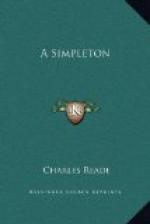“Oh, indeed,” said Staines. “Then it is a pity you have not built it more scientifically. I must have a look at this.”
“Ay do, sir, and advise us if you see anything wrong. But hark! it is milking time. Come and see that.” So she led the way to some sheds, and there they found several cows being milked, each by a little calf and a little Hottentot at the same time, and both fighting and jostling each other for the udder. Now and then a young cow, unused to incongruous twins, would kick impatiently at both animals and scatter them.
“That is their way,” said Phoebe: “they have got it into their silly Hottentot heads as kye won’t yield their milk if the calf is taken away; and it is no use arguing with ’em; they will have their own way; but they are very trusty and honest, poor things. We soon found that out. When we came here first it was in a hired wagon, and Hottentot drivers: so when we came to settle I made ready for a bit of a wrangle. But my maid Sophy, that is nurse now, and a great despiser of heathens, she says, ’Don’t you trouble; them nasty ignorant blacks never charges more than their due.’ ’I forgive ’em,’ says I; ’I wish all white folk was as nice.’ However, I did give them a trifle over, for luck: and then they got together and chattered something near the door, hand in hand. ’La, Sophy,’ says I, ‘what is up now?’ Says she, ’They are blessing of us. Things is come to a pretty pass, for ignorant Muslinmen heathen to be blessing Christian folk.’ ‘Well,’ says I, ‘it won’t hurt us any.’ ’I don’t know,’ says she. ‘I don’t want the devil prayed over me.’ So she cocked that long nose of hers and followed it in a doors.”
By this time they were near the house, and Phoebe was obliged to come to her postscript, for the sake of which, believe me, she had uttered every syllable of this varied chat. “Well, sir,” said she, affecting to proceed without any considerable change of topic, “and how do you find yourself? Have you discovered the past?”
“I have, madam. I remember every leading incident of my life.”
“And has it made you happier?” said Phoebe softly.
“No,” said Christopher gravely. “Memory has brought me misery.”
“I feared as much; for you have lost your fine color, and your eyes are hollow, and lines on your poor brow that were not there before. Are you not sorry you have discovered the past?”
“No, Mrs. Falcon. Give me the sovereign gift of reason, with all the torture it can inflict. I thank God for returning memory, even with the misery it brings.”
Phoebe was silent a long time: then she said in a low, gentle voice, and with the indirectness of a truly feminine nature, “I have plenty of writing-paper in the house; and the post goes south to-morrow, such as ’tis.”
Christopher struggled with his misery, and trembled.
He was silent a long time. Then he said, “No. It is her interest that I should be dead.”




